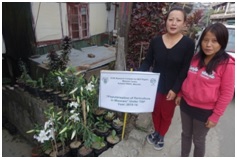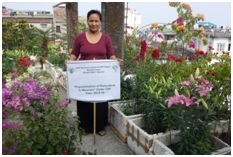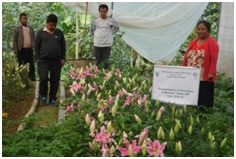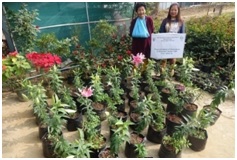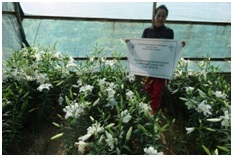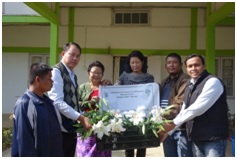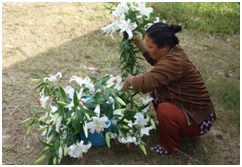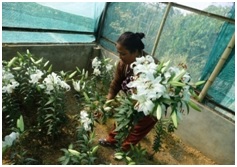Introduction of Lilium enhances income of under-employed farm women in Kolasib district, Mizoram: A Success Story
Mizoram is a leading producer of cut flower crops like Anthurium, orchids, gerbera etc in North-East Indian region. Mizoram is a significant producer and global exporter of Anthurium (over 7 million a year) in the region. Since the region is Christian dominated who traditionally use flowers for religious and other activities there is a gap between demand and supply of flowers in the domestic markets while the UAE, the UK and Japan have good demand of NE orchids and flowers.
Mizoram has just 6% of its cultivated land dedicated to horticulture and floriculture, indicating a large potential for further growth and economic integration with other Indian states. Cultivation of anthurium in Mizoram is still at a small scale with growers having 1000 to 3000 plants which unfortunately do not earn maximum profit, considering the cost of inputs. Anthurium cultivation requires high establishment cost, seedlings and structure cost; also maintaining quality of products and preserving the cut flowers from damage by insects and post- harvest handlings requires extensive care and caution which can be very expensive. The decline in interest of farmers towards Anthurium is due to bacterial blight which is one of the most damaging diseases in anthurium cultivation. Bacterial blight disease can severely decrease flower productivity, and hence reduce the profitability of anthurium cultivation.
Mizoram offers good scope for cultivation of a wide variety of flowers because of its diversities in topography, altitude, congenial agro-climatic conditions coupled with fertile soils and well-distributed rainfall which ensure year-round production of tropical and sub-tropical flowers. In order to diversify the flower crops with Mizo farmers, ICAR Research Complex for NEH Region, Mizoram Centre, Kolasib, Mizoram has conducted a field demonstration under Tribal Sub Plan (TSP) to evaluate Lilium varieties during 2015-2016 at five villages; viz. Khuangpuilam, Vengther, Baulpui, Hmar Veng and Tumpuit in Kolasib district, Mizoram. Advantage of growing Lilium in Mizoram is that (i) it can be grown in open condition(ii) very fast growing (iii) flowering can be synchronized with Christmas and new year (iv) less skilled cultural requirement (v) per stick costs around Rs. 60.00 (vi) relatively less biotic and abiotic stress (vii) high market demand and (viii) a good venture for underemployed farm women.
A total of two training programmes were organized for acquainting the farmers with the recommended package and practices of the flower. Besides the farmers were also supplied with critical inputs such as shed net, UV film, bulbs, FYM and plant protection chemicals. Altogether 40000 Lilium bulbs of four varieties; viz. Siberia, Sorbone, Dazzle and Signature were distributed among 30 female underemployed women farmers. Regular fortnightly monitoring was made by a team of scientists starting from planting to harvesting of the crop. Mamuanii, a representative flower farmer of Khuangpuilam village, received 500 bulbs and planted in net house in the month of September, 2015. She earned an income of Rs. 30,000 from selling the flowers during Christmas. A stick of Lilium costs Rs.60.00 and a bunch of 10 costs Rs. 600 in Kolasib and Aizawl market. Similarly, other farmer also, earning an average income of Rs.15,000-20,000 within a period of four months. The cultivation of Lilium is found to be highly economical with a benefit cost ratio of 4.20 as compared to anthurium cultivation (2.80). After realising the success of the beneficiary farmers, other farmers in the district got motivated and are ready to start Lilum cultivation in small scale in place of anthurium cultivation.. Thus, the interventions have decreased the dependence of farmers on Jhuming and also improved their standard of living, livelihood and socioeconomic status of the villagers.
Dr. SK Dutta Scientist (Horticulture) and Dr. SB Singh (Joint Director) ICAR Research Complex for NEH Region, Mizoram Centre, Kolasib–796 081, Mizoram
